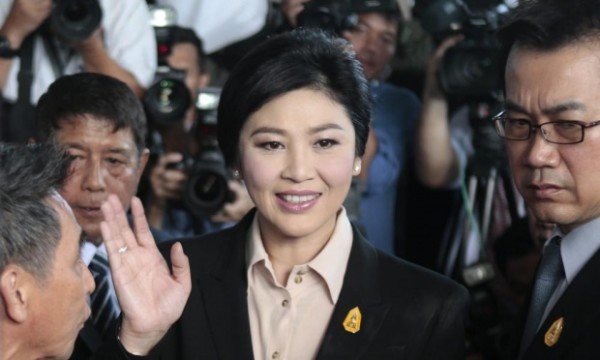Thailand’s ex-PM Yingluck Shinawatra has pleaded not guilty in a brief hearing at the start of her trial on charges of negligence.
Yingluck Shinawatra, 47, faces up to 10 years in prison if found guilty of dereliction of duty over her role in a controversial rice subsidy scheme.
The former prime minister told crowds outside the court in Bangkok she would prove her innocence.
Yingluck Shinawatra was forced to step down last year shortly before a military coup.
She maintains that the charges she faces are intended to keep her out of politics. The next hearing in the trial has been scheduled for July 21.
Meanwhile Yingluck Shinawatra’s brother, Thaksin Shinawatra – himself ousted as prime minister by a previous coup in 2006 – has made a rare public appearance in Seoul, South Korea, saying he believed “democracy will prevail” in Thailand.
Thailand’s Constitutional Court forced Yingluck Shinawatra from office in early May 2014 after finding her guilty of abusing her power. Weeks later, the military seized power saying it needed to restore order following months of street protests.
In January 2015, Yingluck Shinawatra was retroactively impeached by a military-appointed legislature for her role in the rice subsidy scheme. She was also banned from politics for five years.
The scheme paid rice farmers in rural areas – where Yingluck Shinawatra’s party has most of its support – twice the market rate for their crops, in a program that cost the government billions of dollars.
Arriving at the Supreme Court on May 19, Yingluck Shinawatra told journalists she was confident of her innocence.
“I prepared myself well today and am ready to defend myself,” Reuters quoted the former prime minister as saying.
“I hope that I will be awarded justice.”
A small group of her supporters outside the court chanted “Yingluck, fight, fight!” as she arrived, though political gatherings are illegal under Thailand’s military rule.
Yingluck Shinawatra says she was not involved in the scheme’s day-to-day operations and has defended it as an attempt to support the rural poor.
Thaksin Shinawatra was removed by a previous coup in 2006. He now lives in self-imposed exile to avoid a jail sentence for corruption.
However, the influence of the family persists, with parties allied to the Shinawatras winning every election since 2001.
They are loved in the rural north for their populist policies, but hated by Thailand’s elite who accuse them of corruption.
